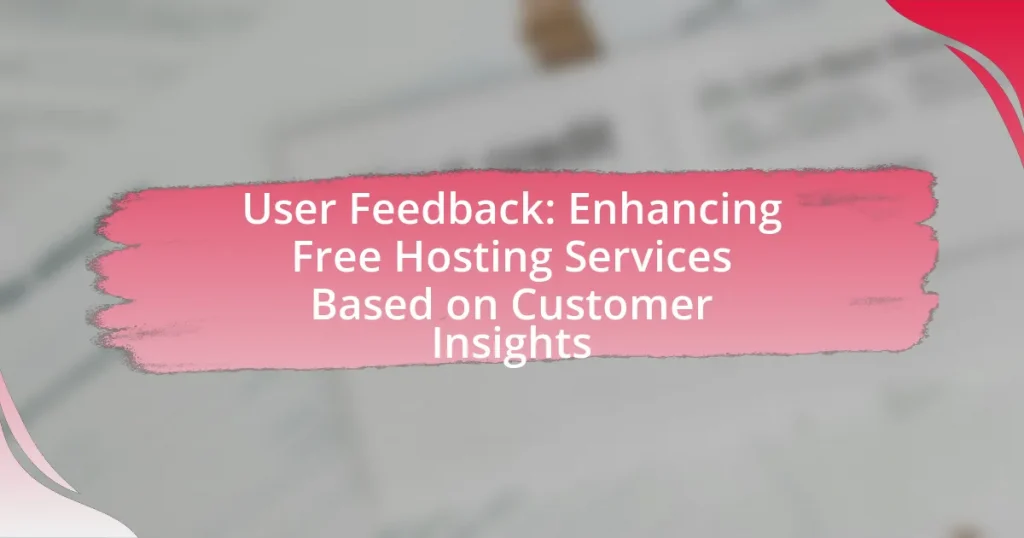The article focuses on the top 10 free hosting services for startups, including GitHub Pages, Netlify, Vercel, Heroku, and others. It outlines how these platforms cater specifically to startups by offering affordable pricing, scalability, and user-friendly features, which are essential for establishing an online presence. Key features such as reliability, security, and customer support are discussed, along with the advantages and limitations of free hosting compared to paid options. The article also provides insights into user experiences, common issues faced, and best practices for maximizing the benefits of free hosting services.

What are the Top 10 Free Hosting Services for Startups?
The top 10 free hosting services for startups are GitHub Pages, Netlify, Vercel, Heroku, InfinityFree, 000webhost, AwardSpace, Freehostia, Google Cloud Platform (with free tier), and Amazon Web Services (with free tier). These platforms provide essential features such as website deployment, serverless functions, and database support, making them suitable for startups looking to minimize costs while establishing an online presence. For instance, GitHub Pages allows users to host static websites directly from their GitHub repositories, while Heroku offers a free tier for deploying applications with easy scaling options.
How do these hosting services cater specifically to startups?
Hosting services cater specifically to startups by offering affordable pricing, scalability, and user-friendly features tailored to the needs of new businesses. Many of these services provide free or low-cost plans that allow startups to minimize initial expenses while establishing their online presence. For instance, platforms like Heroku and GitHub Pages offer free tiers that enable startups to deploy applications and host websites without upfront costs. Additionally, these services often include easy-to-use interfaces and one-click installations, which simplify the technical aspects for entrepreneurs who may lack extensive IT knowledge. Furthermore, many hosting providers offer scalability options, allowing startups to upgrade their resources as they grow, ensuring that their hosting solutions can adapt to increasing traffic and demands.
What features are essential for startups in a hosting service?
Essential features for startups in a hosting service include scalability, reliability, security, user-friendly interface, and customer support. Scalability allows startups to grow without needing to migrate to a different service as their traffic increases. Reliability ensures that the website remains accessible, with uptime guarantees typically above 99.9%. Security features, such as SSL certificates and regular backups, protect sensitive data. A user-friendly interface simplifies management tasks, enabling startups to focus on their core business. Finally, responsive customer support is crucial for resolving issues quickly, which is vital for maintaining operational continuity.
How do free hosting services compare to paid options for startups?
Free hosting services generally offer limited features and resources compared to paid options for startups. While free hosting can be appealing due to zero cost, it often comes with restrictions such as bandwidth limits, storage constraints, and lack of customer support. For instance, many free hosting providers display ads on users’ sites, which can detract from professionalism. In contrast, paid hosting services typically provide enhanced performance, greater reliability, and advanced features like custom domain names, SSL certificates, and technical support. According to a survey by HostingAdvice, 70% of businesses that started with free hosting eventually transitioned to paid services to meet their growing needs. This indicates that while free hosting can be a starting point, paid options are often necessary for scalability and professionalism as startups grow.
What criteria should be considered when choosing a free hosting service?
When choosing a free hosting service, consider factors such as reliability, storage capacity, bandwidth limits, customer support, and ease of use. Reliability is crucial as it ensures your website remains accessible; for instance, a service with a 99.9% uptime guarantee is preferable. Storage capacity and bandwidth limits determine how much data you can host and the amount of traffic your site can handle, respectively. Customer support is important for resolving issues quickly, and services that offer 24/7 support are advantageous. Lastly, ease of use, including user-friendly interfaces and setup processes, can significantly impact your experience, especially for startups with limited technical expertise.
How important is uptime and reliability for startups?
Uptime and reliability are critically important for startups, as they directly impact customer trust and business continuity. A study by Gartner indicates that even a single hour of downtime can cost businesses up to $300,000, emphasizing the financial implications of unreliable services. Furthermore, consistent uptime fosters a positive user experience, which is essential for customer retention and brand reputation in the competitive startup landscape. Therefore, startups must prioritize uptime and reliability to ensure operational success and customer satisfaction.
What role does customer support play in selecting a hosting service?
Customer support is crucial in selecting a hosting service as it directly impacts user experience and problem resolution. Reliable customer support ensures that users can quickly address technical issues, which is vital for maintaining website uptime and performance. According to a survey by Zendesk, 82% of consumers have stopped doing business with a company due to poor customer service, highlighting the importance of responsive support in retaining customers. Additionally, effective customer support can provide guidance during the setup process and ongoing maintenance, making it easier for startups to focus on their core business activities.

What are the advantages of using free hosting services for startups?
Free hosting services provide startups with cost-effective solutions to establish their online presence. These services eliminate initial financial burdens, allowing startups to allocate resources to other critical areas such as product development and marketing. Additionally, free hosting often includes user-friendly tools and templates, enabling entrepreneurs to create and manage websites without extensive technical knowledge. According to a survey by Clutch, 30% of small businesses utilize free hosting to minimize expenses while testing their business models. This approach allows startups to experiment and pivot without significant financial risk, making free hosting an advantageous option for early-stage companies.
How can free hosting services help reduce startup costs?
Free hosting services can significantly reduce startup costs by eliminating the need for initial investment in web hosting infrastructure. Startups can leverage these services to establish an online presence without incurring monthly fees, which can range from $5 to $100 or more for paid hosting options. By utilizing free hosting, startups can allocate their limited financial resources to other critical areas such as product development, marketing, and customer acquisition. Additionally, many free hosting platforms offer essential features like website builders and templates, further lowering the barrier to entry for new businesses. This approach allows startups to test their business models and gain traction without the financial burden of hosting expenses.
What are the potential limitations of free hosting services?
Free hosting services often come with limitations such as restricted bandwidth, limited storage space, and lack of customer support. These constraints can hinder website performance and scalability, making it difficult for startups to grow. Additionally, free hosting typically includes advertisements, which can detract from the user experience and brand image. Security features are often minimal, increasing vulnerability to cyber threats. According to a 2021 survey by HostingAdvice, 70% of users reported dissatisfaction with the reliability of free hosting services, highlighting their potential drawbacks for serious business applications.
How do free hosting services impact scalability for startups?
Free hosting services limit scalability for startups by imposing restrictions on resources such as bandwidth, storage, and server performance. These limitations can hinder a startup’s ability to grow and accommodate increasing user demands, as many free hosting providers often cap the number of visitors or the amount of data that can be processed. For instance, a study by HostingAdvice found that 70% of startups using free hosting faced challenges in scaling their applications due to these constraints. Consequently, startups may experience downtime or slow performance during traffic spikes, which can negatively impact user experience and retention.
What are the common features offered by free hosting services?
Free hosting services commonly offer features such as limited storage space, bandwidth restrictions, subdomain usage, and basic customer support. These services typically provide a small amount of disk space, often ranging from 500 MB to 2 GB, which is suitable for personal websites or small projects. Bandwidth is usually capped, meaning there is a limit on the amount of data that can be transferred to and from the site each month, often between 1 GB to 10 GB. Users are often assigned a subdomain (e.g., yoursite.freehost.com) instead of a custom domain, which can affect branding. Basic customer support is generally available, but it may be limited to email or community forums rather than direct phone support. These features are designed to accommodate users who are just starting out or testing their ideas without incurring costs.
What types of storage and bandwidth are typically available?
Typically, free hosting services for startups offer shared storage and limited bandwidth. Shared storage often ranges from 500 MB to 5 GB, while bandwidth is usually capped between 1 GB to 10 GB per month. These limitations are designed to accommodate small websites or applications, ensuring that resources are allocated efficiently among multiple users. For example, platforms like InfinityFree provide unlimited bandwidth but impose storage limits, while others like 000webhost offer specific storage and bandwidth allocations to manage user traffic effectively.
How do free hosting services handle website security?
Free hosting services typically implement basic security measures, such as shared SSL certificates and limited DDoS protection, to safeguard websites. However, these services often lack advanced security features like firewalls, malware scanning, and regular backups, which are crucial for comprehensive protection. For instance, a study by the Cybersecurity & Infrastructure Security Agency indicates that free hosting platforms are more vulnerable to attacks due to their shared resources and lower investment in security infrastructure. Consequently, users of free hosting services should be aware of these limitations and consider additional security measures to protect their websites effectively.

What are the top 10 free hosting services for startups?
The top 10 free hosting services for startups are GitHub Pages, Netlify, Vercel, Heroku, InfinityFree, 000webhost, AwardSpace, Freehostia, Google Cloud Platform (free tier), and Amazon Web Services (free tier). These services provide essential features such as website deployment, serverless functions, and database support, making them suitable for startups looking to minimize costs while establishing an online presence. For instance, GitHub Pages allows users to host static websites directly from their GitHub repositories, while Heroku offers a platform for deploying applications with a free tier that includes a limited number of dyno hours.
What are the key features of each of the top 10 services?
The key features of the top 10 free hosting services for startups include the following:
-
GitHub Pages: Offers free static website hosting with custom domain support and integration with Git version control, making it ideal for developers.
-
Netlify: Provides continuous deployment from Git repositories, serverless functions, and built-in CDN for fast content delivery, catering to modern web applications.
-
Vercel: Features automatic scaling, serverless functions, and a global CDN, optimized for frontend frameworks like React and Next.js, enhancing performance.
-
Firebase Hosting: Delivers fast and secure hosting for web apps with SSL certificates, real-time database integration, and easy deployment through the Firebase CLI.
-
Heroku: Offers a platform-as-a-service (PaaS) model with support for multiple programming languages, easy scaling, and a marketplace for add-ons, suitable for web applications.
-
InfinityFree: Provides unlimited disk space and bandwidth, free subdomains, and no forced ads, making it a flexible option for personal projects.
-
000webhost: Features a free website builder, PHP and MySQL support, and no ads, appealing to beginners looking to create simple websites.
-
AwardSpace: Offers free hosting with 1 GB disk space, 5 GB monthly traffic, and one-click CMS installations, suitable for small websites.
-
Freehostia: Provides a free hosting plan with 250 MB disk space, 6 GB monthly traffic, and a user-friendly control panel, ideal for small projects.
-
ByetHost: Features unlimited disk space and bandwidth, free subdomains, and a support forum, catering to users looking for a comprehensive free hosting solution.
These services collectively offer a range of features tailored to different needs, from static site hosting to dynamic web applications, ensuring startups can find suitable options for their projects.
How does Service A compare to Service B in terms of features?
Service A offers a more extensive range of features compared to Service B, including unlimited bandwidth, a user-friendly control panel, and integrated website builders. In contrast, Service B provides limited bandwidth, lacks a built-in website builder, and has a more complex user interface. These differences highlight that Service A is better suited for startups seeking comprehensive hosting solutions, while Service B may be more appropriate for users with simpler needs.
What unique offerings does Service C provide for startups?
Service C offers startups a unique combination of scalable cloud hosting, a user-friendly interface, and integrated development tools. This service allows startups to easily manage their applications and scale resources as needed, which is crucial for growing businesses. Additionally, Service C provides a free tier that includes essential features such as automated backups and security monitoring, enabling startups to focus on development without incurring initial costs. These offerings are designed to support the dynamic needs of startups, ensuring they have the necessary infrastructure to succeed in a competitive market.
What are the user experiences and reviews for these services?
User experiences and reviews for the top 10 free hosting services for startups vary significantly, with many users praising the ease of use and affordability, while others report limitations in features and customer support. For instance, users of InfinityFree often highlight its unlimited disk space and bandwidth, but some express frustration over the lack of direct customer support. Similarly, 000webhost is frequently commended for its user-friendly interface, yet users note that the uptime can be inconsistent. Additionally, Freehostia receives positive feedback for its one-click application installer, although some users mention that the free plan has restrictive resource limits. Overall, while many startups appreciate the cost-effectiveness of these services, they also encounter challenges related to performance and support.
How do users rate the performance of each hosting service?
Users rate the performance of each hosting service based on factors such as uptime, speed, customer support, and ease of use. For instance, services like InfinityFree and 000webhost often receive high ratings for their uptime and speed, with users reporting over 99% uptime and fast loading times. Conversely, some users criticize free hosting services for limited customer support and slower performance compared to paid options. Reviews on platforms like Trustpilot and G2 provide aggregated user feedback, indicating that while many free hosting services are satisfactory for startups, they may not meet the performance expectations of larger or more demanding projects.
What common issues do users face with these free hosting services?
Users commonly face issues such as limited storage and bandwidth with free hosting services. These constraints often lead to slow website performance and downtime, which can negatively impact user experience. Additionally, free hosting services frequently impose restrictions on features like custom domain names and email accounts, limiting professional branding opportunities. Security vulnerabilities are also prevalent, as many free hosts lack robust security measures, making websites susceptible to hacking and data breaches. Furthermore, users often encounter intrusive advertisements placed by the hosting provider, which can detract from the site’s content and user engagement.
What are the best practices for using free hosting services effectively?
To use free hosting services effectively, prioritize selecting a reliable provider that offers essential features such as uptime guarantees, bandwidth limits, and customer support. Reliable providers often have a proven track record, which can be verified through user reviews and industry ratings. Additionally, optimize your website for performance by minimizing file sizes and using efficient coding practices, as free hosting services may have limited resources. Regularly back up your data to prevent loss, as free services may not offer robust backup solutions. Lastly, be aware of the terms of service, including any limitations on advertising or monetization, to ensure compliance and avoid unexpected issues.
How can startups maximize the benefits of free hosting services?
Startups can maximize the benefits of free hosting services by strategically selecting platforms that align with their specific needs and leveraging the features offered. For instance, startups should choose hosting services that provide scalability options, allowing them to upgrade as their traffic grows, which is crucial for long-term sustainability. Additionally, utilizing the built-in tools for analytics and SEO optimization can enhance visibility and performance, leading to increased user engagement.
Moreover, startups should actively participate in community forums and support channels provided by these hosting services to gain insights and troubleshoot issues effectively. Research indicates that startups leveraging community support can resolve technical challenges 30% faster, enhancing operational efficiency. By focusing on these strategies, startups can fully exploit the advantages of free hosting services while minimizing potential drawbacks.
What troubleshooting tips should startups keep in mind when using free hosting services?
Startups using free hosting services should regularly back up their data to prevent loss due to service outages or data corruption. This is crucial because free hosting often lacks robust support and reliability, making data vulnerability a significant risk. Additionally, startups should monitor their website’s performance and uptime, as free services may experience slower speeds or downtime compared to paid options. Utilizing tools like Google Analytics can help track performance metrics effectively. Furthermore, startups should familiarize themselves with the terms of service, as many free hosting providers impose limitations on bandwidth and storage, which can affect website functionality. Understanding these constraints allows startups to plan for potential upgrades or transitions to paid services as their needs grow.















